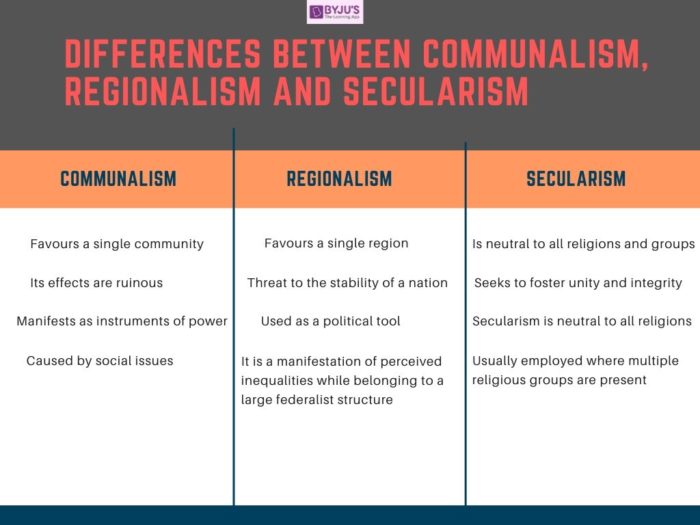Communalism, Regionalism and Secularism are political ideologies with different belief systems and different modes of application.
Communalism is defined as prioritizing affiliation towards one’s own ethnic group rather than the society as a whole.
Regionalism can be defined as a political ideology focusing on the “development of a political or social system based on one or more” regions.
Secularism is the principle that the affairs of the state are distinct from religion and vice versa.

All of the three terms are concepts that are part of the UPSC Indian Polity Syllabus
This article will further highlight the differences between Communalism, Regionalism and Secularism
The difference between the Communalism, Regionalism and Secularism is highlighted in the table below:
Differences between Communalism, Regionalism and Secularism
| Differentiating Factors | Communalism | Regionalism | Secularism |
| Ideology | Communalism is a philosophical notion | Regionalism is primarily motivated by economic, social and cultural inequalities | Secularism believes that religion and state should not interfere in the affairs of the other |
| Effects | Communalism causes competition, ferocity and tension among different communities | Regionalism threatens the integrity and unity of a particular nation | If applied in the correct manner, secularism can bring stability and peace to society |
| Expression | Communalism manifests as an expression of the superiority of one’s community and intolerance of different communities | Regionalism is developed as an expression of a group identity devoted to a particular region | Secularism treats all religious groups equally in the sense that no single religion will be favoured over the other in any form |
| Application | Communalism is used as an instrument of power, not necessarily for capturing state power but for also operating in economic, social and political domains | Regionalism is usually applied by regional political parties to further their interest at the expense of other regions. It is one of the fundamental drawbacks of federalism in India | Secularism is usually applied in multi-cultural societies with different religious groups by making the state neutral to all religions |
| Place in Society | Communalism is looked upon unfavourably in society. | Regionalism finds fewer takers in a population that does not believes in the upliftment of the entire country as a whole | Secularism is enshrined in the Constitution of India following the 42nd Amendment in 1976 |
| Origins | The term “communalism” was first coined by socialist author Murray Bookchin in the early 20th Century | Although it is hard to pinpoint the exact origin of the term “regionalism”, one can safely assume that the imperialistic practices of ancient empires were the earliest manifestations of regionalism | The term “secularism” was first used by the British writer George Holyoake in 1851. Holyoake invented the term secularism to describe his views of promoting a social order separate from religion |
You can understand these three terms in great detail through the links given below:
- Secularism
- Regionalism in India
- Communalism in Post-Independent India
- Difference between Western Secularism and Indian Secularism
For more difference between articles, visit the linked article
Difference Between Communalism, Regionalism and Secularism – Download PDF Here
Frequently Asked Questions about Regionalism, Communalism and Secularism
What is economic regionalism?
What are the main features of communalism?
Familiarise yourself with the general pattern of the UPSC Exams by visiting the UPSC Syllabus
page. For more articles and exam-related preparation materials, refer to the links given in the table below:
Related Links
Comments